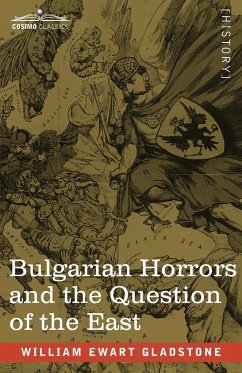
Bulgarian Horrors and the Question of the East

PAYBACK Punkte
6 °P sammeln!
"…we now know in detail that there have been perpetrated, under the immediate authority of a Government, to which all the time we have been giving the strongest moral, and for part of the time even material, support, crimes and outrages, so vast in scale as to exceed all modern example, and so unutterably vile as well as fierce in character, that it passes the power of heart to conceive, and of tongue and pen adequately to describe them. These are the Bulgarian horrors; and the question is, what can and should be done, either to punish, or to brand, or to prevent?" -W.E. Gladstone, Bulgarian...
"…we now know in detail that there have been perpetrated, under the immediate authority of a Government, to which all the time we have been giving the strongest moral, and for part of the time even material, support, crimes and outrages, so vast in scale as to exceed all modern example, and so unutterably vile as well as fierce in character, that it passes the power of heart to conceive, and of tongue and pen adequately to describe them. These are the Bulgarian horrors; and the question is, what can and should be done, either to punish, or to brand, or to prevent?" -W.E. Gladstone, Bulgarian Horrors and the Question of the East The Great Eastern Crisis began in 1875 when the Balkan provinces Serbia and Montenegro rose up against the Ottoman Empire. In Britain, the Conservative government of Benjamin Disraeli initially did not appear concerned about this crisis. However, this changed when the London newspaper The Daily News publicized the atrocities committed by the Ottomans against the Christians in Bulgaria, and especially when the former Liberal Prime Minister William Gladstone published his pamphlet Bulgarian Horrors and the Question of the East (1876). In this fascinating publication, which sold 200,000 copies, Gladstone expressed his sympathies for the Balkan Christians and called for independence of the Balkan states.














